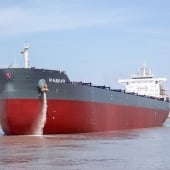The drought experienced in the Panama Canal Watershed for the last six months continues to have disruptive effect on the operation of the Panama Canal and by extension Intermarine’s vessels. Precipitation in October was the lowest on record for the month since 1950, coming in 41% below expected levels. Gatun Lake, which is a part of the canal system, and also provides fresh water for the Panama Canal locks, depends on rain to maintain its water level. Each Canal transit consumes a large amount of water, regardless of the size of the ship. The lack of water available to the Canal not only restricts the draft of the vessels that can transit the Gatun Lake but also limits the number of vessels that are allowed to transit through the lock system because of the need to conserve water.
The Panama Canal Authority is currently allowing only a fraction of vessels that typically transit the Canal on a daily basis to undertake the voyage though the water way. They are assigning the few available reservations to those companies that most frequently transit the canal, for example, those carriers who have vessels that transit weekly or several times a week. Occasionally, a carrier misses their reservation, and that slot is auctioned to the highest bidder. The Panama Canal Authority predicts that this situation will not improve until early next year. Intermarine continues to monitor the situation and tries daily for available slots.
Meanwhile, Intermarine is routing our vessels to and from the West Coast of South America via the Magellan Straits, which comes with additional transit time and cost to the voyage. We continue to look for ways to reduce the transit times and cost when possible.
The safe and efficient transportation of our customer’s cargo remains our primary focus. Please be assured that we will continue to closely monitor the conditions at the Panama Canal and keep our customers updated as the situation develops.


